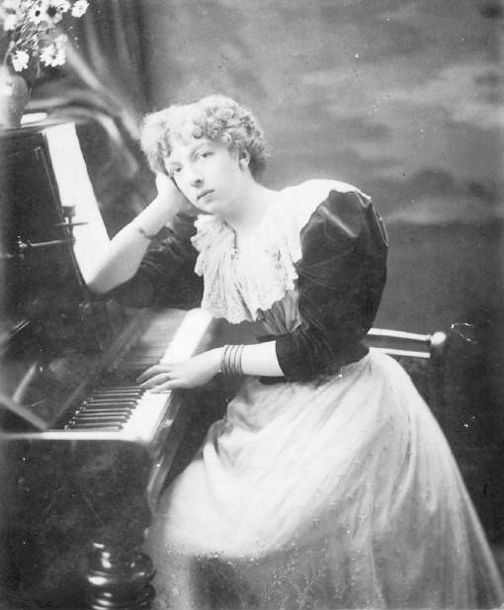By Nestor CASTIGLIONE
“The future is female,” a slogan with roots in the 1970s, was one among many that captured the imaginations of many in peculiarly slogan-rich 2016. But we forget that the past, too, has been female – though that story sometimes has been forgotten, if not deliberately buried. Case in point: The music and life of Cécile Chaminade.
The French composer’s “Piano Trio No. 2” will form a nexus between works of Fauré and Debussy at the next Le Salon de Musiques concert on Sunday, April 2.
Born in 1857, Chaminade enjoyed global renown at the zenith of her career. As a pianist she earned high praise. But given the narrow societal views of her time and place, she earned unusual renown and respect as a composer.
Among her admirers were Georges Bizet, Ambroise Thomas and Marcel Proust (in whose “In Search of Lost Time” she appears among the tapestry of characters). In 1908 she toured the United States, receiving warm critical and public acclaim. And in 1913 the French government awarded her the Legion of Honor – the first woman to ever earn the distinction.
The glittering achievements that studded her first five decades makes the subsequent decline in her fortunes over the next decades all the more cruel. Because despite her talent, her fame gradually faded.
Sexist attitudes in the world of art that persisted throughout Chaminade’s lifetime contributed to this. But, perhaps more importantly, her music – with its winsome and easy charm that looked back ever more longingly at the 19th century with each passing year of the 20th – had fallen out of favor in the wake of the Great War and the revolutionary musical modernism it unleashed. Upon her death in Monaco in 1944, her legacy, even in France, had largely vanished.
In the 1970s, with the resurgence of interest in the music of the Romantics, that began to change. Major classical labels, such as Hyperion and Deutsche Grammophon, have issued recordings of her music in recent years. And with its questing programming, it was only natural that Le Salon de Musiques – thanks to the research and erudition of its founder François Chouchan – should eventually perform one of her chamber works.
Violinist Serena McKinney, who will be among the performers this Sunday, agreed to answer a few questions concerning Chaminade.
Crescenta Valley Weekly (CVW): The “Piano Trio No. 2” of Cécile Chaminade shares space on the program with better-known works by Debussy and Fauré. Though it may not be apparent from the diverse stylistic trajectories of these composers, the paths of all three composers did indeed cross in one way or another. Can you please talk a little bit about how their lives intersected and informed each other?
Serena McKinney (SMK): If you compare the early works of Fauré, Debussy, and Chaminade, they all share salon-like qualities. High value is placed upon tuneful, singable melodies – harmonic structure that is very Romantic and traditional, and with technical challenges that are flashy for the public. In the Paris Conservatory, Chaminade was immersed in studying Ravel and Fauré, and their styles of writing are obvious in her composing, as that was the music she was largely playing.
CVW: Chaminade was once a very well-known composer. Her work received favorable notice both at home and abroad. Yet today she’s remembered as a footnote in musical history (or in the biography of her friend Marcel Proust). What accounts for this reversal in Chaminade’s fortunes? Why is she worthy of reexamination today?
SMK: I think the public has recently taken a stronger interest in female composers. Chaminade is undoubtedly one of the most important of all female composers due to the breadth, depth and variety of writing. Her success during her lifetime was largely due to her active presence as a very successful concert pianist. Since live music was the vehicle for fame at the time, she was a model of sorts for Fauré and Debussy.
I think being female held her works back from more frequent performance due to the gender prejudice on the part of the critics. [Now] is the perfect time for the public to appreciate her brilliance with fresh ears.
CVW: What qualities does Chaminade’s music have that you feel are inimitably unique to her?
SMK: Chaminade is unabashedly flashy, tuneful and nationalistic with unexpected harmonic shifts, and unique patterns and sequences. Her special respect for classicism combined with salon sensibilities makes her music immediately appealing on a first hearing.
CVW: Is the playing of Chaminade’s music similarly ingratiating for the performer as it is for the listener? Why or why not? How has it felt for you to work on this score for April’s Le Salon de Musiques concert?
SMK: I find Chaminade ingratiating in that in every phrase you feel and hear echoes of all of the important composers of her time. Patterns are familiar yet new. There is a logic in her writing that makes it very musically and technically satisfying. It is always clear that she had a very confident sense of what makes a performer feel satisfied. Working on this program has been so rewarding as she was every bit as inspired in her writing for the violin, and she truly understands what makes the instrument sound beautiful, sing, and reach the audience in the most immediate and memorable way.Le Salon de Musiques’ April program will take place at 4 p.m. this Sunday, April 2 at the Dorothy Chandler Pavilion in Downtown Los Angeles (135 N. Grand Ave., 4th floor). Tickets are $85 for general admission and $45 for students. To obtain tickets and more information please visit http://www.lesalondemusiques.com/tickets.asp or call (310) 498-0257.

